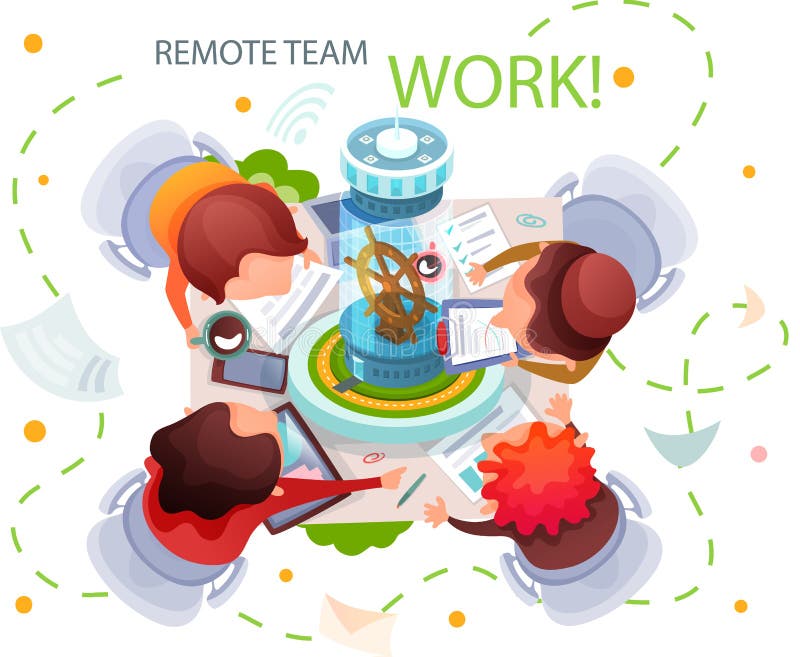Just How to Construct an Effective Team of Remote Professionals
In today's increasingly electronic landscape, the capability to construct a successful team of remote professionals is necessary for companies intending to grow. Crucial element such as defining clear objectives, cultivating efficient interaction, and selecting proper cooperation tools play a pivotal function in this procedure. It is the subtler facets-- like nurturing a natural firm culture and promoting continuous learning-- that can absolutely establish a remote team apart. Recognizing how to integrate these aspects may elevate even more inquiries than answers, specifically when taking into consideration the distinct difficulties that remote job presents.
Define Clear Goals and Assumptions
Often developing clear objectives and assumptions is crucial for the success of a remote team (Remote Professionals). Without these elements, employee might experience confusion concerning their duties, responsibilities, and the overall objectives of the project. This ambiguity can bring about lowered performance, misaligned efforts, and inevitably, project failing
To define clear goals, it is important to utilize the SMART standards-- Particular, Measurable, Achievable, Appropriate, and Time-bound. This method ensures that each goal is well-defined and can be effectively communicated to all staff member. Furthermore, it is essential to line up specific purposes with the overarching vision of the company, promoting a feeling of function and commitment among staff member.

Foster Effective Interaction

Normal check-ins and team meetings can help maintain a solid communication circulation, enabling members to share progress updates and talk about any kind of obstacles they might experience. It is also crucial to acknowledge that different individuals might have varying communication designs. Recognizing and accommodating these distinctions can result in more purposeful interactions and a more natural group dynamic.
Furthermore, clearness is crucial in all forms of communication, whether created or spoken. When needed, urge group participants to express their concepts succinctly and to look for explanation. This strategy reduces misconceptions and makes certain that everyone gets on the very same page. By prioritizing effective communication, remote teams can improve efficiency, strengthen partnerships, and produce an extra inclusive workplace, ultimately leading to better success in attaining typical objectives.

Use the Right Devices
To support effective interaction within a remote group, it is necessary to make use of the right devices that help with collaboration and streamline process. The selection of tools can substantially impact efficiency, guaranteeing that team members remain connected and engaged despite geographical distances.
Begin by implementing project monitoring software, such as Trello or Asana, to organize jobs, set target dates, and track progression. This cultivates accountability and supplies exposure into each member's payments. Additionally, communication systems like Slack or Microsoft Teams use instant messaging capacities, enabling real-time conversations and quick decision-making.
Video clip conferencing devices, such as Zoom or Google Meet, are crucial for face-to-face communications, which help construct rapport and my review here strengthen relationships among group participants. File sharing and storage space services like Google Drive or Dropbox make sure that important files are editable and available by all team participants, advertising cooperation on tasks.
Integrating these tools properly creates a setting where remote experts can grow. By picking the right modern technology, organizations can improve communication, boost task management, and ultimately accomplish their goals extra efficiently.
Construct a Strong Company Culture
Developing a solid company culture within a remote team is essential for promoting involvement and commitment among employees. A distinct society supplies a feeling of belonging and shared objective, which is vital when employee are distributed throughout different places. To cultivate this culture, leaders should develop clear values and assumptions that resonate with employees, making certain that everyone comprehends the goal and vision of the organization.
Normal communication is crucial in learn this here now enhancing this society. Utilizing video clip calls, team conferences, and casual check-ins can aid keep links and promote transparency. Additionally, celebrating accomplishments, both small and large, reinforces a culture of acknowledgment and recognition.
Urging team cooperation with virtual systems not just enhances efficiency but additionally cultivates social connections - Remote Professionals. Organizing virtual team-building tasks can further strengthen bonds amongst staff member, making them really feel much more integrated into the company
Last but not least, it is essential to pay attention to employee feedback and adapt as needed. By revealing that their voices matter, leaders can build depend on and commitment, ultimately producing a flourishing remote workplace where employees feel valued and engaged.
Urge Constant Understanding and Advancement
A strong firm culture prepares for encouraging continual understanding and growth within a remote team. By promoting a setting that values development, organizations can encourage workers to improve their skills, adapt to new obstacles, and eventually add a lot more effectively to team objectives.
To advertise continuous understanding, take into consideration executing routine training sessions, workshops, and webinars that straighten with both individual job goals and business needs. Leverage technology to help with access to e-learning systems, guaranteeing that resources are easily available for remote staff member.
Motivate expertise sharing by establishing mentorship programs and creating discussion forums for employees to trade insights and ideal techniques. Rewarding and acknowledging staff member who actively engage in learning campaigns strengthens the importance of advancement and inspires others to do the same.
Furthermore, carrying out routine responses sessions can help determine ability gaps and areas for renovation, enabling customized growth plans. By focusing on continuous knowing and growth, remote groups can grow a culture of adaptability, development, and strength, which are important for browsing the complexities these days's company landscape.
Verdict
Finally, the establishment of an effective remote group depends upon the assimilation of clear objectives, effective interaction, ideal devices, a durable company society, and continuous understanding chances. By straightening private payments with business goals and promoting a setting of openness and cooperation, remote experts can flourish. Remote Professionals. The execution of these techniques not just enhances group cohesion however likewise drives inspiration, ultimately bring about boosted efficiency and success in a remote working landscape
It is the subtler facets-- like nurturing a cohesive firm society and advertising constant knowing-- that can really set a remote group apart.Reliable communication is the cornerstone of a flourishing remote group. By prioritizing navigate to these guys effective interaction, remote groups can boost efficiency, strengthen partnerships, and produce a more inclusive job setting, ultimately leading to better success in accomplishing usual objectives.
Developing a strong firm culture within a remote team is essential for promoting involvement and loyalty among employees.In final thought, the establishment of a successful remote group pivots on the assimilation of clear objectives, reliable communication, proper tools, a durable firm culture, and continual understanding opportunities.